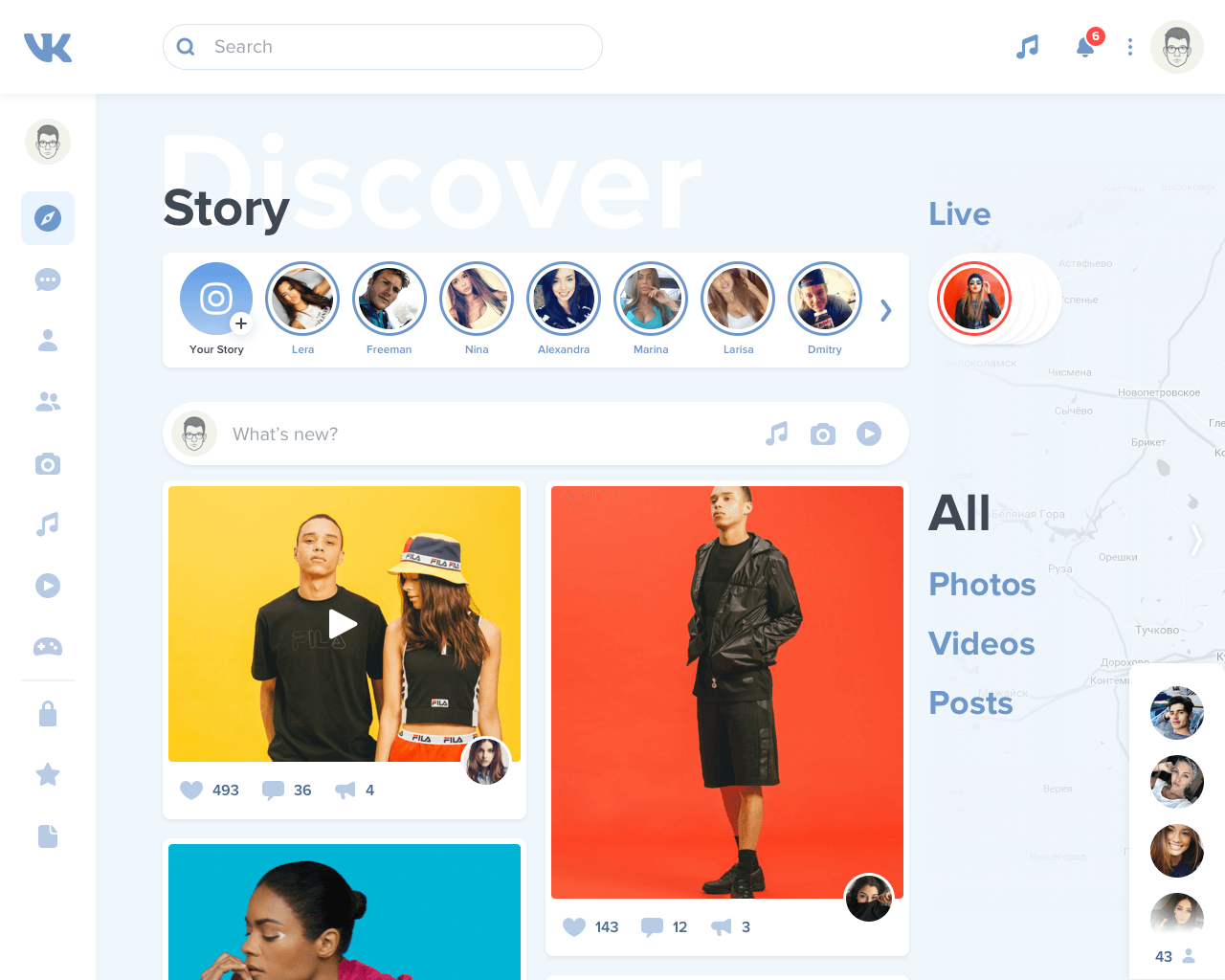Around 100 million Russian people visit at least one social network every day. Facebook, Twitter, YouTube and Odnoklassniki are among the ‘top’ most visited platforms, but only one of them tops this ranking in the Russian Federation: VKontakte (vk.com).
Since its creation in 2006, VKontakte has become a giant of social networks, with a popularity that transcends the boundaries of Russian territory. This is evidenced by the number of international visitors, more than 460 million, compared to 70 million in Russia. But what is VKontakte and why do Facebook and other industry giants have reason to fear it?
VKontakte, the number 1 social network in Russia
The most visited websites in the Russian Federation? Yandex and VKontakte. But this platform is not only the second most visited site in a country with 143 million inhabitants (2017): it is also the most used social network in Russia, ahead of Odnoklassniki, Facebook and Twitter.
Although Facebook has a translated version for this audience, a study conducted at the Henrich Heine University in Düsseldorf (Germany) revealed that Russian users consider that the social network VKontakte is far superior to that of Mark Zuckerberg, highlighting specific aspects, such as ease of use, security or entertainment, as the most valued qualities of VKontakte.
Although many consider VK as the Russian Facebook, the target of this platform is very different. While the Zuckerberg page has mostly users over 35 (largely due to the impact of Instagram and Snapchat on 20-30 year audiences), the VKontakte user profile is less than 30 years old. This can be explained, in part, because this social network favours more its users to share audio and video files, with more flexible copyrights rules – in VKontakte you can find movies in several languages and stay a long time in their servers before they are removed.
Another notable difference between Facebook and its Russian counterpart is the dynamics of friendships because in the first social network it is possible to add friends without the need for both to know each other: in theory, VKontakte favors ‘true’ friendships. VKontakte also has a ‘Like’ button that is suspiciously similar to Facebook’s, even if its developers deny it.
VKontakte, in data
A look at the VKontakte figures shows the success of this social network within and outside the Russian territory:
- VKontakte has 400 million registered users. The number of people who connect monthly to this social network is 90 million, no less.
- In addition to being the most visited social network in Russia, ranks seventh in the global traffic ranking offered by SimilarWeb, while Alexa ranks in the fifteenth place.
- The most visited social networks in Russia are the following, in order. Audiences differ strongly. 80% of all VKontakte users are under 34, a relatively mature audience compared to other social channels.
- VKontakte users are especially reactive to fashion, health, gadgets and tourism ads. Advertisers of clothing and fashion accessories enjoy higher conversion rates of up to 40%.
- VKontakte’s expansionist ambitions have led its developers to translate the platform into Spanish, Armenian, English, Ukrainian, Portuguese, German, Chinese, Polish, Hungarian, Slovak, Serbian, Greek, Romanian and even Esperanto, among others.
Pavel Durov, the Russian Zuckerberg behind VKontakte
Although the social network VK is clearly inspired by Facebook and has borrowed many of its ideas (VK Live is based on Facebook Live, obviously), in its origins tried to correct many of the errors that this platform had when it was launched, with endless bugs (programming errors).
For Yuri Sinódov, founder of Roem.ru, Facebook “took too long in its loading times” and its mobile usability “was uncomfortable”. This dissatisfaction was a fantastic ‘breeding ground’ for VKontakte to be very well received by the Russian public, as it was immediately after its release on 19 January 2007.
Pavel Durov, who is currently CEO of Telegram and accumulates a fortune of 260 million dollars, was the ‘father’ of VKontakte. It all started with a series of beta tests in September 2006, shortly after graduating from St. Petersburg State University. After acquiring the domain VKontakte.ru, it was officially published, addressing only university circles and with a very unfortunate requirement: an invitation to open an account, which limited its expansion at the earliest stage of its growth.
However, these and other roughnesses were corrected over the years, learning by the evils that security should be one of the pillars of VKontakte’s success (in 2007 it suffered a DDoS attack that paralysed the platform), until overcoming its nearest rival, Odnoklassniki, in 2008.
What are the most notable characteristics of VKontakte?
Both the design and functionalities of the social network VKontakte maintain obvious similarities with Facebook, so those users who are familiar with this platform will have much ground gained in VK.
However, VKontakte differs in aspects such as messaging, as private messages can be exchanged between groups of 2 to 500 people, no more and no less. Each message can also contain up to ten attachments (photos, videos, audios and even maps).
VKontakte users can publish on the wall of their profile, without any limitation, except for attachments (10 maximum), and the use of mentions, hashtags, videos, photos, documents, etc. is allowed. As if that weren’t enough, it has a news recommendation and global search engine in real time.
The communities of VKontakte are varied, classified into Groups (consisting of discussion forums), Events (ideal for concerts and cultural encounters, musical, etc.) and Public Pages (which resemble Facebook pages, intended for brands and celebrities).
As we have been warning, the social network VK has its own version of the button ‘Like’, used in all networks, sometimes as a heart and other times as a thumb up. VKontakte uses a button with the platform icon and the label мне нравится (or Like). Users must also press a second button to share content with their friends, as ‘Like’ does not have this option associated with it.
However, the synchronization of VK with other social channels is far from brilliant. While it is possible to integrate Facebook and Twitter and use SMS messaging services, platforms such as Instagram are strongly vetoed in VKontakte. The cause of this small censorship lies in a matter of interest, since VK launched in 2014 a Russian version of Instagram, Snapster, which is naturally a clone from head to toe.
Finally, VKontakte’s privacy options have nothing to envy of those of Facebook, especially after the scandals of this social network in recent years (see ‘Facebook Gate’). VK users can control the visibility of their personal data and content on the Internet by having an account deletion process similar to Facebook.
VKontakte, a social network where advertisers are welcome
VKontakte’s business model is based mainly on advertising, and brands and companies are free to create an account by entering an email and a mobile phone number, requiring the sending of an activation code, a process that aims to prevent possible fraud.
In general, ad prices vary according to the category and the quality of the audience to which your advertising campaigns are directed. VK advertisers, and any of their users, have a limited number of options and media to advertise: on the site, in communities, in the news section or in VK Live broadcasts, among others.
As it could not be otherwise, the potential audience and its target are different in each of these spaces. For example, VK Live can only be used on mobile devices, which means that the potential consumer is a mobile user, probably young and a digital native.
And is that the social network VKontakte, whether or not a Russian replica of Facebook, has demonstrated its dominance in the social networking sector, where it will continue to expand into new segments, such as messaging applications, as its developers announced the launch of their own Messenger, according to The Kozweek.





